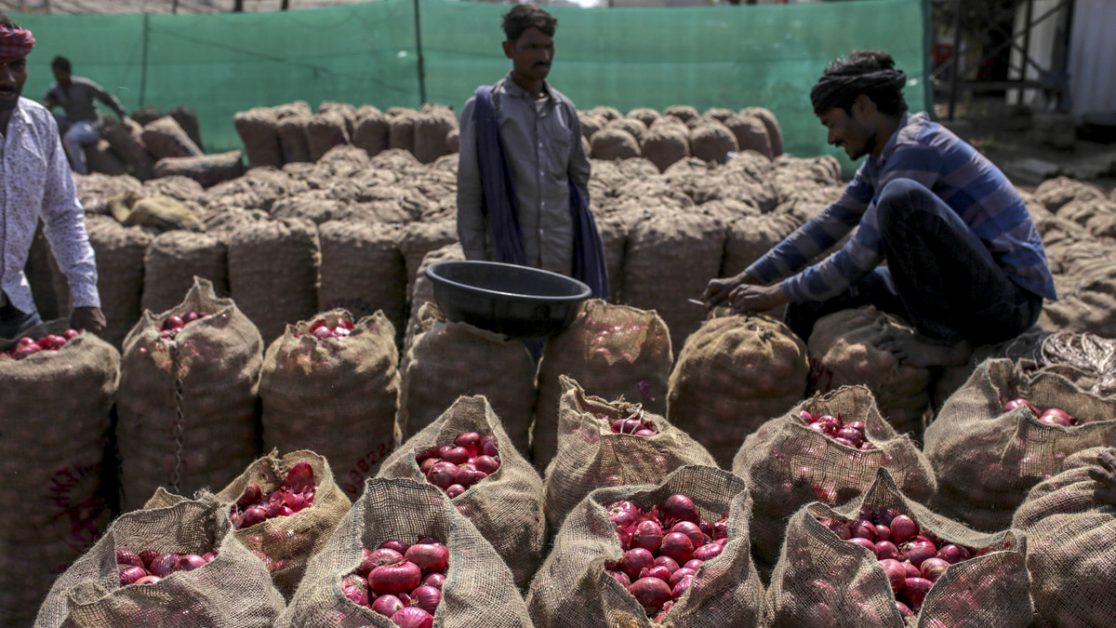Source: The Kathmandu Post
In its notification issued on Saturday, the Directorate General of Foreign Trade of India said that the export policy for onions is amended from “prohibited” to “free”, subject to the set minimum export price with immediate effect and until further orders.
With the floor price, Nepali traders say onion may cost more than Rs100 per kg, adding the transport costs and the value-added tax (VAT), the additional levy the Nepal government charges on imported vegetables, said Mohan Baniya, president of the Potato-Onion Import-Export and Wholesaler Association.
Currently, onions are available for Rs60 per kg in the wholesale market and cost Rs90 per kg in retail.
The red bulb, the vital kitchen ingredient, has been restricted by India since December last year. Despite the ban, onion supply is abundant in the Nepali market, according to the traders.
Baniya said traders haven’t imported onions in the last five months. “However, there is no dearth of onions in the market, thanks to illegal imports.”
India decided to lift the ban, after taking into account estimated rabi production in 2024 and good kharif (summer-sown) prospects because of above-normal monsoon, Reuters said quoting an Indian government official.
“Onion supply was normal despite the Indian ban in the past months. But now, the minimum export price may send the price higher,” said Binay Shrestha, information officer at the Kalimati Fruits and Vegetable Market Development Board, Nepal’s largest vegetable trading centre.
“During India’s ban on onion, its smuggling thrived in Nepal mainly due to the price difference between the two neighbours.”
Onions, which are a major ingredient in Indian food and a politically sensitive commodity, are cultivated three times a year—in monsoon, winter and summer.
As there is no commercial cultivation of the crop in Nepal, the country is dependent on the spice from India.
Nepal gets almost all of its onion requirement from the southern neighbour, and any ripple there is amplified when it reaches the Nepali bazaar.
In Nepal, Chinese onions, which are available in bigger sizes and are relatively cheaper, are not preferred due to their taste.
The ban was enforced by the world’s biggest exporter of the vegetable last December and then extended in March. The price nearly doubled to Rs200 a kg in retail in the Nepali market, from Rs120 per kg, following India’s export ban.
Prices, however, started to cool down, after smuggling soared.
Nepal police seized thousands of tonnes of onion being smuggled through the southern border, according to reports.
Despite the Nepali customs office in the boarding area conducting regular inspections, onions continued to be smuggled, particularly, on motorbikes.
The policy changes come in the middle of staggered voting in India’s national election in which Prime Minister Narendra Modi is seeking a rare third term.
Onions have historically influenced India’s political landscape during elections.
Last month, according to Indian media reports, the Congress criticised the Modi government for neglecting Maharashtra’s onion farmers affected by the export ban. They mentioned that their manifesto pledges a predictable import-export policy to avoid sudden and harmful policies being enforced on farmers.
The Indian onion traders and farmers, especially from Maharashtra, have been urging the government to lift the banlifted, saying that it would help farmers get better prices.
However, the government did not lift the ban fearing that the export of this crucial kitchen staple could lead to a surge in onion prices in India.
On November 4 last year, the Indian government imposed a minimum export price of $800 per tonne till December 31, 2023, to maintain sufficient availability of onion to its consumers at affordable prices.
After the minimum export price was slapped, the wholesale price of onion jumped to Rs125 per kg in Nepal from Rs75 per kg previously.
In mid-November, the price reached Rs150 per kg. Before the minimum export price in November, India had imposed a 40 percent export duty on onions.
In November 2019, the price of onion hit a new high of Rs250 per kg in Kathmandu Valley after India slapped a ban on onion export in September that year to maintain domestic availability.
The ban caused severe shortages of onions all over Asia including Nepal. The embargo was lifted in March 2020. India again stopped onion exports from September 2020 to January 2021.
On Saturday, onion was priced Rs60 per kg on average in the wholesale market, down from Rs68 per kg. On Friday, according to the Kalimati vegetable market, 50 tonnes of onion were imported, compared to 71 tonnes a week ago. Nepal imported 18,019 tonnes of onion worth Rs6.75 billion in the last fiscal year ended in mid-July 2023.








